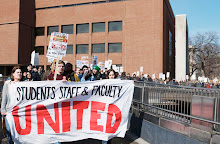The FCC closed two meetings in less than two months--the March 25 and April 15 meetings. We have made inquiries into why these meetings have been closed, since we think that open meetings are essential if faculty are to be well-informed about our University.
Bill Gleason has questioned the legality of closing the meetings, arguing that the FCC is subject to the Open Meeting Law. (Read more here: http://ptable.blogspot.com/2010/04/is-university-of-minnesota-skirting.html#links and http://ptable.blogspot.com/2010/05/is-university-of-minnesota-skirting.html#links)
The General Counsel asserts that the FCC is not subject to the Open Meeting Law. The Senate bylaws do permit the FCC to close its meetings, in part or in their entirety, with a 2/3rd majority vote. The FCC has stated a number of reasons for closing meetings. The predominant concern is that administrators only speak candidly on some matters if the meeting is off the record. It would be unwise, they say, to inhibit the candid exchange of views. Concerns were also raised about the wisdom of letting reporters and legislators read minutes that outlined legislative strategy or that publicized sharp differences of opinion between the FCC and administrators.
We recognize that it is sometimes necessary to close meetings, but closing the *entirety* of two meetings in less than a month is worrisome. Why was it deemed necessary to close all of the proceedings? The March 25 meeting discussed the agenda items for the Faculty Senate meeting that was to take place later in the day. It was imprudent for the FCC to agree to close that meeting, given the importance of the items discussed at the March 25 Faculty Senate meeting. Closing that meeting gave the impression that the FCC was colluding with the administration. (The fact that the FCC unanimously supported the President's proposal only strengthens this impression, unfortunately.) The April 15 meeting focused on the "intellectual future of the University." At this meeting a wide range of issues were discussed, including light-rail transit; the bonding bill; the possibility of a new covenant with the state; the work of the college and other offices' blue-ribbon committees; a peer review of the University's budget model; the need to redesign the service, business, and academic cultures of the University; the size of the University; the nature of faculty appointments (e.g., tenured versus contract/P&A) and the optimal department size; and the progress of the Graduate School working groups on preparation of their final report. The FCC should explain why it was necessary to close the entire meeting when such a wide range of important matters of interest to the University community were discussed.
Even more worrisome is that the only FCC meetings that were closed during this period were the two meetings attended by President Bruininks. Why won't the Prez speak candidly on the record? (Hopefully the FCC is not volunteering to close meetings ahead of time--we assume that the FCC prefers open meetings and only considers closing them if the administration has requested that they be closed.) Given the purely consultative role that faculty play in governance, it is unwise for the FCC to close meetings when it speaks to the administration on matters vital to our future. Such actions provide more ammunition to those who think that Senate committees have been domesticated by the administration. Democratic governance requires the administration to speak candidly ON THE RECORD on important matters. The public disclosure of sharp differences of opinion between the faculty and the administration is essential. We cannot sweep those disagreements under the carpet just because they might be misconstrued by outside parties.
If the FCC wants to be a trusted body, then it needs to agree less readily to closing meetings, or at the very least to close small portions of meetings rather than their entirety. If the administration will not speak candidly on the record, call them out on it. The worst that can happen is that the admin won't meet with the FCC or will do so but make vapid statements that are of no use whatsoever, which would merely expose what a sham faculty governance is. (And besides, at the end of the day, what can the FCC do other than say, "Mr. Prez, we really disagree with you on this, would you please consider tweaking this misconceived policy?" Since faculty cannot bind the administration, he can do whatever he wants. Moreover, if it is all done behind closed doors, the wider faculty cannot mobilize to support the FCC in its negotiations with the administration.) Faculty should not put ourselves in the position of being supplicants to the administration. Rather, the proper relationship is one in which faculty call on the administration and *require* the administration to speak on the record, and to make it very uncomfortable for them if they refuse to be candid with us. They serve us, we don't serve them.
Saturday, May 8, 2010
Subscribe to:
Post Comments (Atom)


No comments:
Post a Comment